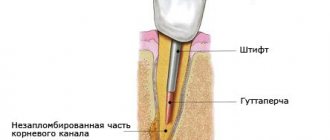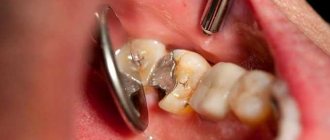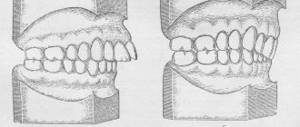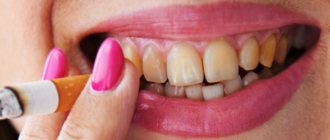Tooth sensitivity is a common dental problem that causes discomfort or pain in the teeth when exposed to certain substances and temperatures.
This is made worse by the fact that the pain is often sharp and sudden. And although it is temporary, it can “shoot” at the nerve endings of the tooth, and, as you know, there is nothing pleasant about this. Fortunately, sensitive teeth can be treated quite effectively.
People often say that they are lucky with their teeth and they don't bother them at all. But it also happens that a sharp pain in a tooth takes you by surprise during their brushing, lunch break or at a dinner party. No one is immune from this kind of problem - neither children nor adults, since there are a lot of factors that can cause discomfort.
Why do teeth react to heat?
There are many causes of hyperesthesia, and not all of them are obvious upon a quick examination.
- Caries. Indeed, it can become the culprit of pain. But, as a rule, in this case we are not talking about a superficial lesion, but about large carious cavities hidden under the gum, in the area of the neck of the tooth. Sometimes a dental examination is not enough to detect them; the problem can only be identified with the help of an x-ray.
- Newly installed filling. If your tooth begins to react to heat for the first time after visiting the dentist, there is no need to sound the alarm. Normally, after a few days, the gum microtraumas will heal and the tooth enamel will be restored.
- Other dental interventions. Increased tooth sensitivity for several days after cleaning or whitening is an absolute norm and does not require dental intervention. A reaction to heat will definitely occur after tooth preparation, for example, before installing veneers or crowns. Unpleasant sensations from hot tea are guaranteed in the first days after the removal of a gum pocket over a wisdom tooth or any other procedure that traumatized the gums. In 83% of cases, the tooth aches due to a non-carious lesion, for example, a wedge-shaped defect or pathological abrasion of the enamel. Such conditions progress quickly, but are difficult to treat. That is why, given the prevalence of the problem, at the first cases of discomfort caused by hot food, you should urgently consult a dentist.
- Increased tooth wear. Normally, the process of enamel abrasion is almost invisible. With pathology, by the age of 35-40, the length of the visible part of the tooth can decrease by 30-50%. Moreover, the process, as a rule, affects all teeth, without exception. There are several reasons for increased abrasion: bruxism, prolonged and frequent chewing of solid foods, straight bite, exposure to chemicals. For example, for workers involved in the production of inorganic acids, increased enamel abrasion is an inevitable occupational disease.
- Cervical wedge-shaped defect. In adulthood and old age, more often, a kind of step may form at the neck of the canines and premolars. It is not as harmless as it might seem at first glance. At first, the defect will make itself felt only by a slight reaction to hot foods, but later it can lead to chipping of the entire coronal part. The cause of the disease is not completely clear, but many dentists are convinced that the whole issue is due to many years of improper oral care, namely, too harsh brushing of teeth.
- Erosion of enamel. This type of non-carious tooth damage is more common among young patients under the age of 30-35 years. At first, the enamel is covered with whitish spots, which over time acquire a yellow and then a brown tint.
Erosion can be caused by:
- external factors: excessive consumption of sweets, juices, carbonated drinks, addiction to aggressive whitening agents, wearing braces;
- internal causes: reflux of gastric juice into the esophagus due to reflux disease, regular induction of vomiting with anorexia, and even banal heartburn, which recurs too often.
At least 10% of all cases of hyperesthesia are caused by other dental pathologies. The dentist can identify them during a conversation with the patient and during an examination.
- Microcracks in enamel. In the most advanced cases, even the patient himself in the mirror can see longitudinal stripes crossing the entire surface of the tooth. At the initial stage, digital transillumination will help detect the problem. In a darkened room exposed to ultraviolet rays, healthy enamel emits a blue glow, while the affected areas remain darkened. Microcracks appear as a result of the habit of cracking seeds, love of hard nuts and candies.
- Recession (recession) of the gums. This is a pathology in which the gum gradually drops below the enamel-cementum border, exposing the neck of the tooth. The latter remains absolutely defenseless against any influences, including hot food. Sometimes recession develops as an independent disease due to the congenital thin gum biotype or age. But more often, prolapse is a consequence of periodontal disease.
- Sometimes, during an examination, the doctor does not detect any dental problem, but the patient cannot even eat a spoonful of hot soup without pain. In this case, the problem will have to be looked for by involving doctors of other profiles: a neurologist and endocrinologist, a gynecologist and gastroenterologist, a pediatrician and an immunologist. It is these specialists who are able to identify the cause of hyperesthesia caused by systemic disorders in the body.
- Pregnancy. While expecting a baby, many women face the problem of increased tooth sensitivity. In this case, it is likely that the dentist will not detect any pathological changes in the enamel or gum disease. Healthy teeth hurt due to a hormonal storm in the body, and a woman can only do one thing: be patient and wait. As a rule, 12-18 months after birth, hyperesthesia goes away on its own.
- Endocrine disorders. Any problems in the hormonal system can increase acidity in the oral cavity. And this in turn entails an increase in the sensitivity of the enamel.
- Lack of vitamins and minerals. A lack of calcium, magnesium and phosphorus is especially destructive to gums and tooth enamel. For better absorption, they should be taken together with vitamins: phosphorus and calcium with vitamin D, magnesium - in the form of a chelate or gluconate in combination with vitamins B6, C and D.
- Chronic stress. With prolonged emotional overload, the nerve endings, including those in the dental pulp, become so sensitive that they react to the slightest discomfort.
- Exposure to chemicals. Moreover, medications and increased levels of aggressive substances in drinking water, air, and food can be detrimental to tooth enamel.
Medications that can cause hyperesthesia include:
- aspirin;
- tetracycline;
- oral contraceptives;
- other hormonal drugs;
- diuretics;
- cough syrups.
Only one tooth or all of them may experience discomfort when eating hot food. And this fact often suggests the cause of the pain. So, a problem with one tooth is more likely to indicate a mechanical injury. Damage to several teeth located next to or symmetrically to each other indicates increased abrasion. In a generalized form of hyperesthesia, when the entire oral cavity is affected, we can almost certainly talk about systemic problems in the body: hormonal imbalance, metabolism, problems with the gastrointestinal tract.
Why do teeth hurt from sweets, hot and cold?
Only at first glance the tooth looks like a monolithic bone formation. In fact, hidden under the strong enamel is porous dentin and a soft, sensitive pulp, penetrated by a network of nerve fibers. Under the influence of negative factors, tooth enamel becomes thinner, exposing more sensitive tissues. Now, when there is a temperature difference, the enamel is no longer a reliable protection: the dentin tubules quickly and unevenly expand from hot and just as quickly narrow from cold. These impulses are immediately picked up by the nerve endings of the pulp. And they react painfully.
Sensitivity to sweets is explained by the fact that sugar is the best breeding ground for bacteria. When processing sugar, they release acids into the oral cavity. And if you treat yourself to chocolate day after day, your tooth enamel will gradually become thinner. And since dentin is very sensitive to chemical irritants, very soon every lollipop or eclair will feel unbearable pain.
With receding gums and periodontal diseases, the situation is even more serious. In this case, the teeth become clogged because the bacteria have already damaged the not very strong dental cement covering the neck of the tooth. And if you don’t see a dentist in time, you may soon lose your tooth.
Treatment
You can only fight the pain that arises on your own - take symptomatic remedies. For example, Paracetamol or Ibuprofen help to eliminate discomfort for a while and stop the inflammatory process.
Learn more about why teeth hurt when you have a cold
But you shouldn’t put off visiting a doctor; based on the reason, he may prescribe the following treatment:
- Taking antibiotics for swollen gums or fever.
- Placement of fillings - in the presence of caries, the previously affected surface is cleaned.
- Cleaning and filling of root canals - for pulpitis, when the neurovascular bundle is affected.
- Removing the stone.
- Surgical intervention without removal - performed for gumboil, cyst, periodontal disease, granuloma. It is usually performed under local anesthesia.
- Extraction - is prescribed only if it is impossible to save the damaged tooth.
As additional health procedures, special varnishes are used that form an invisible protective film, which reduces tooth sensitivity. This product contains fluoride, which has a strengthening effect on enamel.
11 causes of toothache that everyone should know
There is a misconception that when teeth hurt and ache, alcohol helps. This is not true at all, since it is not considered an analgesic, and when taken together with certain medications, it can cause serious complications. Drinking alcohol and smoking worsens the effect of anesthesia and increases the healing time of tissues.
The lack of therapy only aggravates the situation, causing the patient to suffer from pain that can only be eliminated temporarily on its own.
Tooth reacts to heat after filling
Dental treatment uses a huge range of effects on tooth tissue. And a reaction to hot food after visiting a doctor is a common situation. Even a dead tooth, from which the nerve and pulp have been completely removed, can react to temperature. Normally, within a few days, maximum 2 weeks, the discomfort will completely disappear.
But in some cases, the pain in a filled tooth not only does not subside, but also becomes stronger. There may be several reasons for this:
- not all affected tissue was removed;
- the doctor did not follow the filling technology and the integrity of the filling was damaged;
- there is an air bubble under the filling;
- the pulp burn provoked inflammation of the soft tissues;
- Individual intolerance to the filling material manifested itself.
For the same reasons, hot teeth also hurt. Most likely, the canal was treated poorly. Or the doctor simply removed one canal and did not find the second. This situation is very common when treating anterior teeth. Often, even on their x-rays, 2 channels look like one. In any case, only a dentist can identify and eliminate problems in an already healed tooth.
An overreaction to hot drinks after a whitening procedure is a clear sign of low professionalism of the dentist. In clinics that value their reputation, after whitening, teeth are coated with a protective composition with a high calcium content. And at the slightest manifestation of hyperesthesia, the patient will simply be denied such aggressive intervention, and will be recommended a more gentle method of creating a Hollywood smile.
Symptoms
Signs of toothache depend on the reasons that led to them:
- Caries - acute pain occurs when eating cold, hot, sour, sweet foods. When such an irritant is eliminated, the symptom quickly disappears and sensitivity normalizes.
- Pulpitis is paroxysmal pain, radiating to the temporal part or ear (passes along the path of the trigeminal nerve).
- Periodontitis is a constant, aching pain, localized in the area of the affected front tooth, intensified by mechanical action.
- Exposed roots - the pain is sharp, shooting in nature, manifests itself in attacks.
- Eruption of wisdom teeth - pain can radiate to any teeth, including the front ones.
When the nerve and gums are affected during treatment or tooth extraction, the pain persists for some time; analgesics and anti-inflammatory drugs are used to eliminate it.
What to do if your teeth begin to react to heat?
The first manifestations of hyperesthesia are barely noticeable and fleeting. At first, the sensation can hardly be called pain; rather, it is a slight discomfort that can easily be avoided by giving up the habit of drinking scalding tea or coffee. But it’s better to consult a dentist. The doctor will assess the condition of the enamel, identify the cause of increased sensitivity and prescribe treatment that is suitable for you.
Treatment at home
For increased sensitivity of teeth to hot foods and drinks, traditional medicine recommends using clove and tea tree oils. They can be used to lubricate a problematic tooth without diluting. Or add 3-4 drops to a glass of warm water and rinse your mouth with the solution several times a day.
Well-chosen toothpastes give a good effect:
- Lacalut Sensitive;
- Sensodyne Repair & Protect;
- SPLAT "Biocalcium";
- Aqua Oxygen Mineral Cocktail.
They contain special components that fill microcracks, and sometimes long-acting anesthetics. Of course, toothpastes cannot cure enamel erosion, cope with increased abrasion and other dental problems. But if the enamel has not yet become too thin, they will help you survive an unfavorable period (pregnancy, spring vitamin deficiency, stressful situations) with minimal losses.
Toothpastes for sensitive teeth can be used for more than just brushing. You can simply lubricate your teeth with them to quickly relieve pain.
Treatment in dentistry
A doctor has many ways to overcome hyperesthesia. First of all, the dentist will try to identify the problem of his profile: periodontal disease, caries, non-carious enamel lesions. If there are any, the patient will have to treat the detected pathologies.
If the teeth are healthy, and the patient complains of pain from hot foods, the dentist will recommend contacting a therapist, and then specialists to identify the causes of the problem. And to improve the quality of life, it will seal the dentinal tubules with remineralizing agents, sealants, and desensitizers.
Reason 1. Advanced dental diseases
If there is pain in the upper jaw or lower jaw, this may indicate that you have untreated diseases. Most often, this symptom appears when the pathologies are advanced and acquire an acute purulent character. What could it be? Pulpitis, periodontitis, gumboil, abscess, phlegmon, osteomyelitis, pericoronitis of the wisdom tooth (inflammation of the gingival hood), alveolitis after tooth extraction. In these cases, the tooth hurts, but the painful sensations also spread throughout the head and face, radiating into the eyes and ears.
Periodontitis is characterized by painful sensations when pressing
If bad teeth are to blame, then other unpleasant symptoms are usually added to the pain: the appearance of a lump or abscess on the gum, difficulty opening the mouth, pain while swallowing food, inability to chew normally, swelling and inflammation of the mucous membrane, swelling of the soft tissues of the face, poor bad breath, increased body temperature, acute pain when pressing on the crown.
Often, pain in the lower and upper jaw on the right (or left) can signal an overgrown granuloma or cyst. If the cyst is located on top and is very large, it can grow into the sinuses.
What complications may arise?
The good news is that the tooth’s reaction to hot food is only the first stage of hyperesthesia. And if you contact your dentist in a timely manner, in just a few weeks you will forget about the problem.
If you ignore the slight discomfort from hot tea or coffee, very soon the tooth will begin to react to sweet, salty and spicy foods. In this case, simply unpleasant sensations will be replaced by severe pain, which will no longer recede in 2-3 seconds, but will begin to disappear only after rinsing the mouth, then after taking painkillers. This is the second stage of hyperesthesia.
There is a third one. Now the enamel is so thin that any touch to the tooth is unbearable. Eating, walking in cool weather, drinking tea, brushing your teeth - all this is accompanied by acute, piercing pain. And the worst thing is that it may no longer be possible to restore the native enamel on the teeth at this stage, despite the extensive arsenal of modern dentistry methods.
Diagnostics
Diagnosis is carried out based on the patient’s complaints and the results of additional studies:
- Examination of the patient's oral cavity.
- X-ray – a picture can be taken of one tooth or the entire row. With its help, the condition of regional tissues is also assessed.
- Radiovisiography is a modern method of diagnosing the condition of teeth using digital radiographic equipment.
- CT scan.
Only after making a diagnosis, the doctor prescribes the necessary therapy.
Prevention of tooth sensitivity
To prevent manifestations of hyperesthesia, it is enough to review some habits:
- stop cracking seeds with your teeth;
- never subject the enamel to excessive stress: do not open bottles with your teeth, do not try to peel nuts with them;
- drink carbonated drinks and juices only through a straw.
Women experience symptoms of hyperesthesia almost 2 times more often than representatives of the stronger sex. This is because the fair half of humanity is more prone to worries and depression. And stress worsens the functioning of the gastrointestinal tract, disrupts metabolism and changes the acidity in the mouth. Therefore, to avoid hyperesthesia, it is useful to reconsider your outlook on life and learn to think positively.
Hygiene plays an important role in preventing tooth sensitivity. Oddly enough, but sometimes it turns out to be excessive. Hard brushes, rinses containing ethyl alcohol, love for whitening pastes - all this is better left in the past. But fluoride-containing pastes and brushes of medium hardness will not only effectively remove plaque, but will not damage tooth enamel.
Category Miscellaneous Published by Mister dentist
Reason 7. Dentists' mistakes
Pain in the upper jaw on the right (left) can be caused by perforation of the maxillary sinus during procedures such as sinus lift, implantation using classic, but more often, elongated zygomatic implants. Naturally, the problem arises only if proper thorough preparation for the operation was not carried out, and the work was performed by an unqualified doctor.
To avoid problems, you should carefully choose a specialist
During dental treatment and surgical interventions, the specialist could violate the rules of asepsis or not completely clean out the infection, leaving instruments in the root canals, which subsequently provoked the development of a repeated inflammatory process. Thus, the result of poor-quality treatment can be pain radiating to all parts of the face due to gumboil, alveolitis, abscess, osteomyelitis.
If the doctor used arsenic paste incorrectly during the treatment of pulpitis (did not calculate the dosage, did not take into account contraindications), then the patient may subsequently experience arsenic necrosis of the jaw1, causing severe pain.
Reason 11. Neurological nature of pain
If pain occurs in the upper and lower jaw on the left or right, inflammation or pinching of the trigeminal nerve can be assumed. This nerve has several branches that cover the entire face.
Unpleasant sensations are caused by inflammation of the ternary nerve
Where is the trigeminal nerve located, what symptoms occur when it is inflamed? You will learn about this and much more from the feature article on the site.











